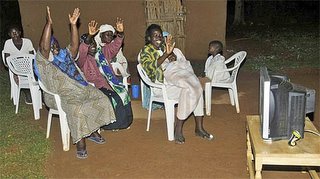Lilongwe, Malawi
We arrived in Malawi Friday afternoon. Steve spent Thursday night on an overnight bus in Zambia and actually slept about 5 hours. From there he went straight to the airport where he found out his ticket had not been paid so he had to run to a bank to get cash to pay it. My flights were good and I was very happy to see the new set-up at the Jo’berg airport for international transfers. It’s a lot nicer than it was. They must be getting ready for World Cup in 2010.
It is quite hot here and Lilongwe is not used to this. There is no air con anywhere that we’ve been and not even many fans. Screens are also rare. We go ahead and open the windows of our little guesthouse during the day but at night when it’s coolest we cannot open the windows because the mosquitoes come in. If it weren’t for malaria, I think I’d just let ‘em in so we could be cooler. It has started raining some and today is not quite as hot.
We enjoyed watching a beauty just like this one in the yard today.

We are staying in a family’s guesthouse. They also have many extended family members coming and going as well as a friend who is staying there. They have a household cleaner, a cook and a gardener/guard. There is a nice garden, lots of fruit trees (the papayas are really sweet), chickens, a rooster that wakes us up and rabbits, dogs and a cat that bites.
The guesthouse is nice with a kitchenette/living room, a bedroom and a bathroom. Saturday we went to buy groceries and were amazed at the prices. Cost of living has really gone up here. Corn, the staple food, tripled in price over a couple of months. Prices are even higher than Maputo because so much is imported from S Africa and the cost of fuel is factored in. We can't bring ourselves to pay $7-8 for a 3 lb. bag of apples even though we love them. After living at an apple orchard and eating many per day, that price is just too much. We will eat our main meals at the WR office at noon and do a lighter meal in the evening.
T was giving me some cultural lessons the other day. In the village it is difficult to get higher education and many of the girls get married young. Usually all the teen girls stay in one house and the young men come calling. They sit on either side and look at each other and even though they may not know each other, the men will pick out a girl and declare that they want to marry her. She can say she is interested or not. If she is, she will give a list of relative’s names to the man and he will begin to contact them. The process for the dowry begins but there are several times when the girl can say yay or nay. T had a lot of pressure from the village aunties and others to marry early, and she turned down several suitors because she wanted to study. She was one of the few who got into university and that is where she met her husband.
When a child is born he/she stays with the mother until he/she is weaned. At that point the first baby goes to the paternal grandmother’s house, at least at night. Following children all to go the maternal grandmother’s house. So, we’ll be waiting for our grandbabies to come live with us! Just kidding… The mother’s sisters have a lot of authority/responsibility over what happens in the child’s life. In other words, the child is not just reared by mom and dad—the whole extended family gets in on the action. It definitely goes along with the cultural sense of community vs. individualism that we have in the West. One of our friends is Cameroonian but she and her husband live in Moz. Her mother wants her to have another child so that she can rear him/her in Cameroon! So this is an African tradition, not just Malawian.
Steve found a spot for some experimental work with amaranth, salba and quinoa at the Nazarene seminary where our friends Jon and Margaret are. We will meet with the other key players today to talk about AfricaWorks Malawi and the way forward.
Yesterday after church at Capital City Baptist (a large church with a good mixture of Malawians and ex-pats) we drove around to learn more about the city. We ended up at a Chinese restaurant and found that the Malawian waitress didn’t speak English too well. We did get our meal ordered after some amusement at the Chinese translations on the menu. Thank God for pictures. Did you know that boiled wheat is noodles? When the food came we were amazed at the spiciness of it. The cooks must be from Szechuan province. One never knows what a day will bring!
